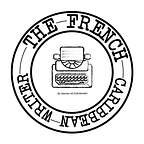What Does Being (a) French Caribbean (Writer) Might Mean?
An opinion column about a young woman’s cultural and identity quest journey
I want to share in the following lines my experience and the vision behind the account The French Caribbean Writer.
Growing up with a low background on our “cultural” neighbours’ history…
As far as I can remember, I didn’t attend a serious full-time course about Guadeloupe islands’ history and about our Caribbean fellow citizens. The idea itself of “being Caribbean” was not infused among us. However, I know that some associations were already doing the job, such as CORECA, based in Guadeloupe.
I remember that I applied successfully to a special program in high school called “Eurocaraïbe” class. At that time, I found the idea really weird. How could we call with such name a French history program translated in English? Today, I couldn’t be more grateful to Ms. P., my English teacher, originated from Aruba. It was a big step. For the travel class we finally went to Miami, but I remembered she tried to get us to a Caribbean island. Too complicated, because of administrative and budget reasons to go to one of our neighbours’ territories.
… and a biased version of “History”
In Guadeloupe and Martinique islands, French history teaching programs are far from complete about our own history. It was a little bit difficult to identify to the so-well taught “national French novel”. Once again, thanks to my “committed” history teacher, Ms. S. in high school, I learned a lot about serious facts (“May 1967” in Guadeloupe) and important figures (other than the famous Césaire and Glissant) such as Paulette Nardal, Gerty Archimède and Henry Sidambarom from our islands. But I was already craving for more.
A feeling of inadequacy when “abroad”
Staying in the Cité internationale universitaire of Paris was an incredible opportunity to meet foreign students. I realized overthere that introducing myself as French and talking about my island sounded weird, to people and then, myself. A student from French overseas territories? Too political and not enough.
Identity cultural crisis is a phrase which would sound a little bit cheesy but accurate here to describe what I felt.
One day, I was attending a history class about The Black Atlantic (based on the Jamaican author Paul Gilroy’s book) in a famous Parisian school. I had a mixed feeling about it: glad that this part of our history was taught and ashamed that I felt unable to know more and then able to share on the subject, with another perspective. That moment was key.
Occupying in a constructive way the media space
Then, what can we do about it? With the coming of citizen journalism, digital spaces/communities and blogs era, we’re offered a lot of opportunities to give life to writing projects and occupy the media space in a useful way. The current context gives more meaning to the aphorism “Representation matters”. To me, it sounds like a call to do the job by creating, putting in light our “words makers” and giving space to a plurality of voices. And taking an active part in writing the future.
Being a proofreader in a double-cultural context
Working as a French proofreader has made me reflecting on my professional practices. When editing both creative writing from a French Caribbean (such as fiction), while making sure the French grammar is not hurt, I always try not to erase the “creolism”, which could be considered as French language mistakes. For a language of Molière defensor, it may sound paradoxical, isn’t it?
And talking about the subject, what could not we name the French language: “plural France language”? Reading Maryse Condé’s writings was really interesting for that: her use of French was colored, imaged and “spicy”.
Conclusion
In a nutshell, I think that there’s no a right answer to that question. It’s both a lifetime and collective journey, and it starts by writing. By learning. By being open and unlearning too. Doing the necessary research and creating resources for the present and future. By creating a community with our neighbours, and get to know them better, reading what they write.
Creating characters, scenes and contexts in our fictions and stories that we can identify to.
You can read my first short story below:
Psssst ! If you’re still here, I found some weeks ago this Facebook group : The Caribbean Writers, interesting to connect with writers and artists from the Caribbean area.
